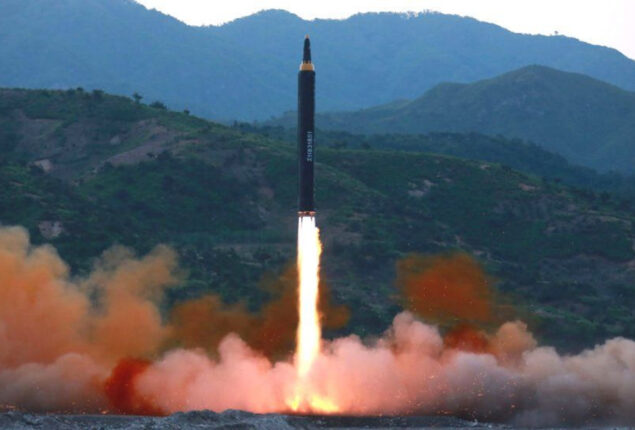North Korea launches missile in East Sea says Seoul’s military
South Korea's military says it detected two short-range ballistic missiles fired from...

Ballistic missile being launched
North Korea launched two ballistic missiles early Saturday morning, the South Korean military reported, marking the fourth such launch by the nuclear-armed nation this week, as Seoul, Tokyo, and Washington intensify cooperative military exercises to challenge Pyongyang.
South Korea, Japan, and the United States conducted their first anti-submarine drills in five years on Friday, only days after the navies of the United States and South Korea conducted large-scale maneuvers in waters off the peninsula.
US Vice President Kamala Harris was also in Seoul on Thursday, when she visited the heavily guarded Demilitarized Zone that divides the peninsula, as part of a trip designed to emphasize the “ironclad” US commitment to South Korea’s defense against North Korea.
Pyongyang has doubled down on its illegal weapons projects, launching a record-breaking blitz of tests this year and changing its laws to declare itself an “irreversible” nuclear power, as negotiations have been stuck for some time.
The military of South Korea said it had “detected two short-range missiles between 0645 and 0703 fired from the Sunan area in Pyongyang into the East Sea”, it added, referring to the body of water also known as the Sea of Japan.
“The military is maintaining the utmost readiness in close coordination with the United States,” underlined Seoul’s Joint Chiefs of Staff.
Japan also reported the firing of two purported ballistic missiles, claiming they fell outside its exclusive economic zones.
Toshiro Ino, vice minister of defense of Japan, stated that the missiles “appear to have followed erratic flight paths.”
“North Korea has been repeating missile launches at an unprecedented pace,” he said.
The uneven trajectories of the missiles demonstrate their ability to maneuver in flight, making them more difficult to track and intercept.
North Korea responded to Harris’s visit to Seoul by launching a flurry of short-range ballistic missiles on Sunday, Wednesday, and Thursday, including just hours after the vice president departed South Korea.
The United States maintains approximately 28,500 troops stationed in South Korea to aid in its defense against the North.
Under the new hawkish president of South Korea, Yoon Suk-yeol, who took office in May, the two nations have increased their joint drills, which they stress are strictly defensive.
In a show of force against Pyongyang, Washington sent the nuclear-powered USS Ronald Reagan aircraft carrier to South Korea to perform a large-scale cooperative naval drill just prior to the arrival of Harris in Seoul.
These exercises anger North Korea, which views them as invasion rehearsals.
“North Korea’s short-range ballistic tests are less important than a nuclear test but still violate UN Security Council resolutions,” said Ewha University professor Leif-Eric Easley, adding that the timing was “provocative.”
He stated that North Korea is “rapidly modernizing weapons and taking advantage of a world divided by US-China rivalry and Russia’s annexation of more Ukrainian territory.”
He said, “Pyongyang’s actions again make clear the need for Washington and Seoul to reinforce military deterrence, tighten economic sanctions, and increase policy coordination with Tokyo.”
South Korean and American authorities have been warning for months that Kim Jong Un, the leader of North Korea, is ready to conduct another nuclear test.
North Korea’s next nuclear test might occur between China’s impending party congress on October 16 and the US midterm elections on November 7, according to the South’s spy service.
North Korea, which is subject to various UN sanctions for its weapons programs, normally strives to maximize the geopolitical impact of its tests by timing them with precision.
Since 2006, the isolated dictatorship has conducted six nuclear tests, the most recent being in 2017.
Catch all the World News, Breaking News Event and Latest News Updates on The BOL News
Download The BOL News App to get the Daily News Update & Follow us on Google News.